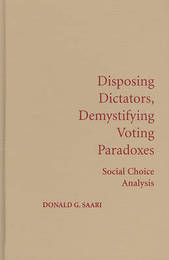
|
Disposing Dictators, Demystifying Voting Paradoxes: Social Choice Analysis
Hardback
Main Details
| Title |
Disposing Dictators, Demystifying Voting Paradoxes: Social Choice Analysis
|
| Authors and Contributors |
By (author) Donald G. Saari
|
| Physical Properties |
| Format:Hardback | | Pages:256 | | Dimensions(mm): Height 236,Width 156 |
|
| Category/Genre | Political economy |
|---|
| ISBN/Barcode |
9780521516051
|
| Classifications | Dewey:324.6015113 |
|---|
| Audience | | Tertiary Education (US: College) | | Professional & Vocational | |
|---|
| Illustrations |
6 Halftones, unspecified
|
|
Publishing Details |
| Publisher |
Cambridge University Press
|
| Imprint |
Cambridge University Press
|
| Publication Date |
25 August 2008 |
| Publication Country |
United Kingdom
|
Description
We decide by elections, but do we elect who the voters really want? The answer, as we have learned over the last two centuries, is 'not necessarily'. What a negative, frightening assertion about a principal tool of democracy! This negativism has been supported by two hundred years of published results showing how bad the situation can be. This expository, largely non-technical book is the first to find positive results showing that the situation is not anywhere as dire and negative as we have been led to believe. Instead there are surprisingly simple explanations for the negative assertions, and positive conclusions can be obtained.
Author Biography
Donald G. Saari is Distinguished Professor of Mathematics and Economics and Honorary Professor of Logic and Philosophy of Science at the University of California-Irvine, where he is Director of the Institute for Mathematical Behavioral Sciences. He previously served on the faculty of Northwestern University from 1968 to 2000, where he held the Pancoe Professorship of Mathematics. A Member of the U.S. National Academy of Sciences, Fellow of the American Academy of Arts and Sciences, and Fellow of the American Association for the Advancement of Science, Professor Saari is the former Chief Editor of the Bulletin of the American Mathematical Society. The author of more than 170 published papers, he has also written numerous books, including Basic Geometry of Voting (1995), Decisions and Elections: Explaining the Unexpected (Cambridge University Press, 2001), Chaotic Elections! A Mathematician Looks at Voting (2001), The Way It Was: Mathematics from the Early Years of the Bulletin (2003), and Collisions, Rings, and Other Newtonian N-Body Problems (2005).
ReviewsAdvance praise: 'The future generations of social choice theorists will certainly find much inspiration and profound insights in this book. For anyone working in the field of voting and social choice the book will provide a rich collection of results, methodological tools, and challenging open problems.' Hannu Nurmi, Academy of Finland Advance praise: 'Donald Saari provides not only an engaging and accessible explanation of the celebrated dictatorial theorems of Arrow, Sen, and Chichilnisky but also an intuitive argument for why we should not be surprised by the negative results of these seminal theorems.' Tommy Ratliff, Wheaton College Advance praise: 'Arrow's theorem is at the origin of the birth of modern social choice theory in the late 1940s and 1950s. Sen's theorem on liberalism and the Pareto principle (published in 1970) created an upsurge of fundamental studies in the so-called non-welfaristic issues in normative economics. Both results are essentially negative (impossibilities). Saari, in this book, demonstrates that we must not overestimate these negative aspects. Particularly noteworthy are the remarkable presentations of the topological approach to social choice and of the generic stability of the core of voting games (including a very short introduction to a new solution concept, the finesse point), where Saari, once again, shows his wonderful pedagogical talent.' Maurice Salles, University of Caen
|